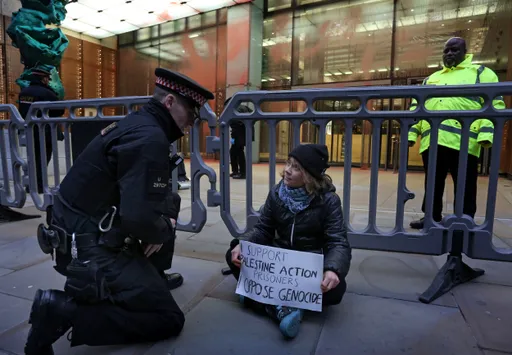British Prime Minister Theresa May landed in Riyadh on Wednesday for talks with the Saudi king and crown prince, with Yemen's brewing humanitarian crisis and the kingdom's sweeping reforms topping her agenda.
May flew in to the Saudi capital on the second leg of her Middle East tour, following a surprise visit to Baghdad where she met her Iraqi counterpart Haider al Abadi and hailed recent military gains against Daesh.
The official Saudi Press Agency confirmed her arrival in Riyadh, where the British leader promised to raise concerns over the Yemen crisis during meetings with King Salman and the powerful Crown Prince Mohammed bin Salman.
Saudi Arabia is Britain's largest trading partner in the Middle East, and London has signed off on more than £3.3 billion ($4.4 billion/3.7 billion euros) worth of arms sales to Riyadh since March 2015.
During that time a Saudi-led coalition has embarked on a bombing campaign in Yemen that has been condemned for contributing to a humanitarian disaster.
The war has killed some 8,600 people, while a further 2,000 have died of cholera.
May insisted that she would send a clear message to the Saudi leadership.
"I'm very concerned about the humanitarian crisis that has developed in Yemen, particularly most recently," May said in comments from Iraq to the BBC.
"That's why the strong message I will be giving to Saudi Arabia tonight is that we want to see Hodeida port opened for humanitarian and commercial access.
"That's important. I think the international community is concerned about the humanitarian crisis in Yemen."
TRT World spoke to Andrew Smith, a spokesman for the Campaign against the Arms Trade. He says while the UK talks about human rights, it's still profiting from Yemen's humanitarian crisis.
Yemen blockade
Earlier this month, the coalition battling Iran-backed Houthi rebels a blockade on Yemen's ports and airports in response to a missile fired by the Iran-backed rebels that was intercepted near Riyadh airport.
It eased the blockade allowing a UN plane carrying vaccines to land on Saturday in rebel-held Sanaa and on Sunday a vessel carrying wheat docked at Saleef Red Sea port, also in the Houthis' hands.
But little aid has entered through the Red Sea port of Hodeida, the main conduit for UN-supervised deliveries of food and medicine.
Separately, during talks in Riyadh, May is expected to express Britain's support for Prince Mohammed's ambitious reform drive, which include a historic decision allowing women to drive from next June.
Iraq visit
Before arriving in Riyadh, May met with her Iraqi counterpart Haider al Abadi in Baghdad on Wednesday, an Iraqi government spokesman said, her first visit to Iraq since coming to power last year.
May left London late Tuesday for a three-day visit to the Middle East in a bid to bolster regional ties. The British leader will be in Jordan on Thursday on the final leg of her tour for meetings with King Abdullah II and Prime Minister Hani Mulki.
Britain is a main partner in the US-led coalition helping Iraq defeat Daesh that overran about a third of Iraq in 2014.
The British government said in September that there were around 600 British soldiers on the ground in Iraq.
They are primarily involved in training Iraqi security forces in battle-winning infantry, engineering and combat medical techniques, as well as providing courses on other skills including countering improvised explosive devices.
Britain provided over 1,400 military personnel as part of its three-year involvement in the US-led coalition.
"Iraqi-British relations are witnessing a marked improvement. We thank the British government for its support of Iraq in all fields, chiefly cooperation against terrorism, air support, and intelligence," Abadi said in a news conference.
Britain had also helped Iraq on the issue of those who were internally displaced as a result of the Daesh takeover and the subsequent campaign by Iraqi forces to dislodge the militants, he said.
"We will continue to support Iraq as a partner in order to enforce security, building, and stability, as well as in training Iraqi forces and efforts to return the displaced," Abadi's office quoted May as saying.
The two leaders discussed British investments in Iraq. May pledged in a news conference to provide 20 million pounds ($26.8 million) in support of human rights and 30 million towards stabilisation efforts and reforms.
Britain agreed in March to arrange 10 billion pounds in loans to finance infrastructure projects in Iraq over a 10 year period, a programme that would only benefit British companies.
Support for Iraq's unity
May "affirmed her support for Iraq's unity" and called on the autonomous Kurdish Regional Government (KRG) in northern Iraq to "respect a united Iraq in all fields," Abadi's office said in a statement.
She said in a news conference, through a translator, that she wanted to see "a united and inclusive Iraq."
Iraqis in territories controlled by the KRG voted overwhelmingly to break away from Iraq in a September 25 referendum, defying the central government in Baghdad and alarming neighbouring Turkey and Iran.
The Iraqi government responded by seizing the KRG-held city of Kirkuk and other territory disputed between the KRG and the central government. It also banned direct flights to the KRG and demanded control over border crossings.
Long-serving KRG president Masoud Barzani stepped down over the affair and the regional government led by his nephew Prime Minister Nechirvan Barzani has tried to negotiate an end to the confrontation.
























